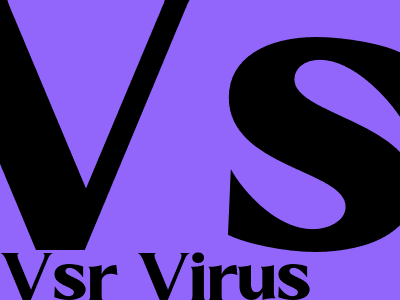How Dangerous Is the VSR Virus?
What is the VSR Virus?
The VSR virus, also known as the human respiratory syncytial virus, is one of the most common causes of lower respiratory tract infections in children worldwide. It is a highly contagious virus that spreads through respiratory droplets when an infected person coughs or sneezes. The virus affects the lungs and airways, causing symptoms such as fever, cough, runny nose, and difficulty breathing.
How is the VSR Virus Transmitted?
The VSR virus is primarily transmitted through respiratory droplets, which are tiny particles of fluid that are released when an infected person coughs or sneezes. These droplets can travel through the air and enter the nose or mouth of another person who is nearby. The virus can also be transmitted through contact with contaminated surfaces or objects, such as toys, doorknobs, or countertops.
Who is at Risk of VSR Infection?
All infants and young children are at risk of VSR infection, but some children are at higher risk than others. These include:
- Children under 6 months of age
- Children with chronic lung conditions, such as asthma or cystic fibrosis
- Children with weakened immune systems
- Children who attend daycare or preschool
- Children who live in crowded conditions
What are the Symptoms of VSR Infection?
The symptoms of VSR infection can range from mild to severe. In most cases, the virus causes cold-like symptoms, such as:
- Fever
- Cough
- Runny nose
- Difficulty breathing
In severe cases, VSR infection can lead to pneumonia, bronchiolitis, or other lower respiratory tract infections. These infections can be life-threatening, especially for infants and young children.
How is VSR Infection Diagnosed?
VSR infection is typically diagnosed based on the symptoms and a physical examination. The doctor may also order a laboratory test to confirm the diagnosis. The test involves collecting a sample of mucus from the nose or throat.
How is VSR Infection Treated?
There is no specific treatment for VSR infection. Treatment is supportive and focuses on relieving symptoms and preventing complications. Treatment may include:
- Rest
- Plenty of fluids
- Over-the-counter pain relievers and fever reducers
- Antiviral medications, such as ribavirin
In severe cases, hospitalization may be necessary. Treatment in the hospital may include oxygen therapy, intravenous fluids, and mechanical ventilation.
How can VSR Infection be Prevented?
There is no vaccine to prevent VSR infection. However, there are some things that can be done to reduce the risk of infection, including:
- Washing hands frequently with soap and water
- Avoiding close contact with people who are sick
- Staying home from work or school if you are sick
- Covering your mouth and nose when you cough or sneeze
- Cleaning and disinfecting surfaces that are frequently touched

Comments